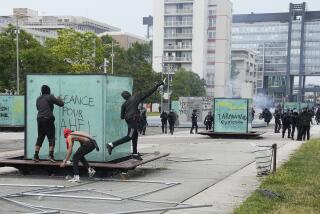Citing Politics, French Ask Light Term for Abdallah in Murder Complicity Trial
- Share via
PARIS — The French government prosecutor called on a special panel of seven judges Friday to find Georges Ibrahim Abdallah guilty of complicity in murder but asked for a relatively light sentence of less than 10 years in prison.
The prosecutor said there is a danger of turning Abdallah, an accused terrorist, into a martyr and making a hostage of France.
The plea, which prosecutor Pierre Baechlin said was made “with a heavy heart,” disappointed U.S. officials who had pressured France into bringing Abdallah, a 35-year-old Lebanese Christian, to trial on charges of complicity in the murder of an American military attache and an Israeli diplomat in 1982 and the attempted murder of an American diplomat in 1984.
Baechlin’s request for a relatively light sentence reinforced press reports that the French government has reached an agreement with the Abdallah clan and the Syrian government to arrange a sentence for Abdallah that would allow his release by the end of the year. Freedom for Abdallah was the main demand of the bombers who terrorized Paris last September with a series of attacks that killed 11 people and wounded more than 160.
If French custom is followed, the judges, who are expected to hand down their verdict today, will not impose a heavier sentence than the prosecutor seeks--if they find Abdallah guilty.
The issue of government pressure on the court was raised in the closing arguments by Georges Kiejman, the lawyer representing the interests of the U.S. government and the American victims. Under French law, outsiders with a special interest in the case may be represented by a lawyer at a criminal trial.
Kiejman told the judges that they must serve justice, not the state, and added, “You are in the service of the law, not in the service of an illicit agreement.”
Recognizing the danger of another round of terrorism, Kiejman insisted that a heavy sentence is necessary to bring an end to France’s status as “a judicial sanctuary for terrorists.”
Governments Disagree
Kiejman, one of France’s most highly regarded and eloquent lawyers, spoke for two hours, but when the government prosecutor arose for his brief statement, it was immediately clear that the French government and the U.S. government were in deep disagreement.
Baechlin, speaking slowly and softly, began with an admonition to Kiejman: “France does not have any lessons to learn from its allies.”
The prosecutor said he had intended to ask for a punishment of “implacable rigor,” but that he now realized that the court must “render a decision that conforms to the interest of everyone.”
He described himself as somewhat like a staff officer in a battle “adapting himself to the terrain and to the circumstances.”
Light Sentence Urged
“With a heavy heart,” he went on, “I beseech you, I implore you, not to pronounce a sentence of more than 10 years. . . . Any severe condemnation would transform the defendant into a martyr and France into a hostage.”
In his plea for Abdallah, defense attorney Jacques Verges sought to ridicule both the evidence against Abdallah and the attempt by the U.S. government to influence the case.
Verges urged the court “to render a decision that does not conform with the wishes of the White House.” The prosecutor, he said, represents “the only republic that counts here.”
Verges went on to dismiss as a joke all the evidence presented to prove that Abdallah was involved in the murder of Lt. Col. Charles R. Ray, a U.S. military attache who was shot in Paris in 1982; the murder of Yacov Barsimantov, an Israeli diplomat shot in Paris in 1982, and the attempted murder of Robert O. Homme, a U.S. consul shot in Strasbourg in 1984.
An organization calling itself the Lebanese Revolutionary Armed Factions claimed responsibility for all three shootings, and the French police had long identified Abdallah as the leader of this group.
Surprise Testimony
But on Wednesday, in surprise testimony that led to a shouting match with Kiejman, Raymond Nart, a top official of the French equivalent of the FBI, told the court that someone else headed the organization and that Abdallah was no more than “a little chief of a little commando.”
Abdallah has already served almost three years of a four-year sentence imposed in Lyon in July of 1986 for possessing false documents and illegal weapons. This prison time would be counted as part of any new sentence. Under French law, a sentence of less than 10 years would probably make Abdallah eligible for parole at the end of 1987.
Abdallah, who identified himself as an Arab combatant against Yankee imperialism at the opening of his trial and then refused to attend the rest of the sessions, comes from a small village in northern Lebanon now under Syrian control. During the September bombings, many French newspapers reported that his clan was helped in its terrorist work by Syrian intelligence agents.
The French government reportedly intended to release Abdallah on two earlier occasions, in March of 1985 in exchange for a French hostage in Lebanon, and last July after Abdallah’s conviction in Lyon. In both cases, however, the government decided otherwise because of new evidence and pressure from the United States.
More to Read
Sign up for Essential California
The most important California stories and recommendations in your inbox every morning.
You may occasionally receive promotional content from the Los Angeles Times.













